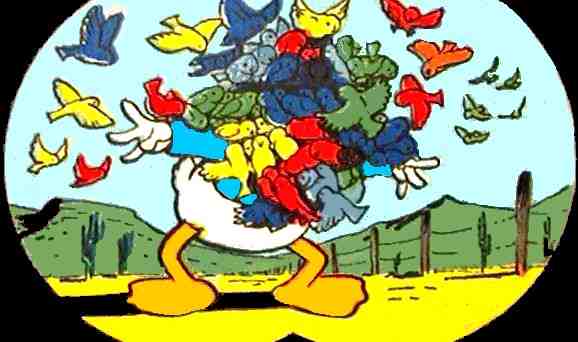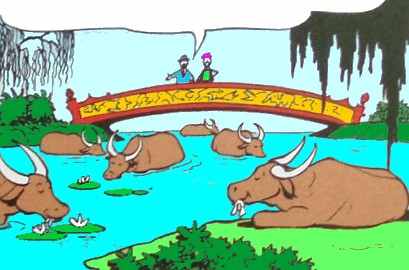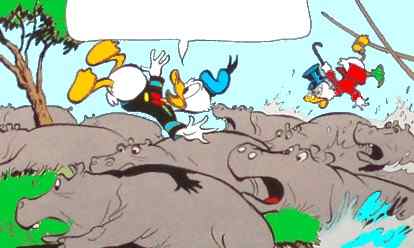

No, the title word does not exist as such! It serves as a suffix (i.e. an appendix) to a large number of animal groups that ends in -vore and means To Eat. Without probably even reflecting on it Carl Barks happened to categorize a great number of his drawn animals in some of the groups that depict animals with specialized eating habits, and some of these are featured below. The English language contains about one hundred types of vores*, so you are only treated to a small selection. You can browse several specialized pages scattered in this website on the main subject of types of animal.
Remarks:
It is important to understand that many of the selected examples
of animals fit into several categories. In a few instances certain groups
of animals do not have a Latin based name, in which case the proper
Greek based name is used. The groups are presented in alphabetical
order, and only with one name although there are in several cases groups
bearing more names.
Also, it is worth noticing that some of the selected panels refer to
Barks' own plotlines, meaning that it is a good thing if you are
familiar with the specific stories in order to gain the full explanation
of the attached term (example: A rabbit has a much more varied diet than just
vegetables, but in the panel's story it specifically begs for money to
buy a bunch of carrots).
* The suffix -vore comes from the Latin Vorare. The corresponding suffix -phagous comes from the Greek Phagein.
|
Apivores Bee eaters |
 Atrachivores Frog eaters |
Baccivores Berry eaters |
 Carnivores Flesh eaters |
 Foliophages Leaf eaters |
Formivorous Ant eaters |
|
Fructivores Fruit eaters |
Fucivores Seaweed eaters |
 Galactophages Milk drinkers |
|
Graminivores Grass/Cereal eaters |
 Granivores Seed eaters |
Herbivores Plant eaters |
Insectivores Insect eaters |
 Larvivores Larvae eaters |
 Lignivores Wood eaters |
 Lotophages Lotus eaters |
Mellivores Honey eaters |
Microphages Small creature or plant eaters |
 Nectarivores Nectar drinkers |
 Nucivores Nut eaters |
Omnivores Allround eaters ... |
 Ostreophages Oyster eaters |
Piscivores Fish eaters |
 Plantivores Plant eaters |
 Radicivores Root eaters |
Sanguivores Blood drinkers |
 Univores One source eaters |
|
Vegetivores Vegetable eaters |
Vermivores Worm eaters |
 Zoophages Animal eaters |
EXTRA

Xylophavores
Word eaters ...
http://www.cbarks.dk/THEVORES.htm |
Date 2017-12-05 |